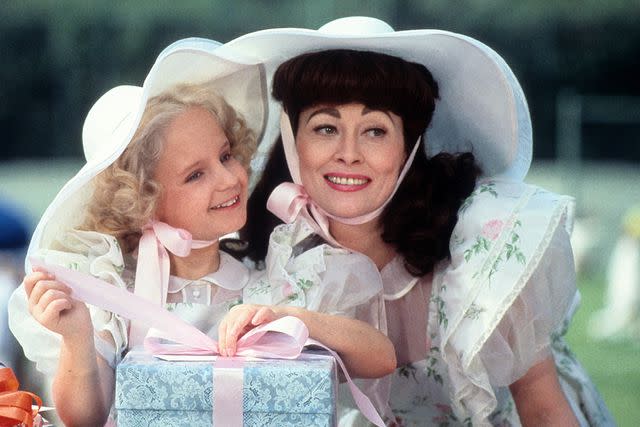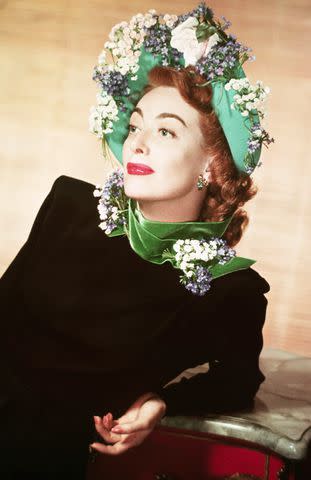Faye Dunaway was reluctant to film the infamous “Mommie Dearest” wire hangers scene

According to a new book, Dunaway balked at beating a little girl with a wire hanger for a memorable scene in "Mommie Dearest."
While "No wire hangers ever" has become a classic bit of movie dialogue, Faye Dunaway almost couldn't film the scene in Mommie Dearest.
A new book, With Love, Mommie Dearest: The Making of an Unintentional Camp Classic, recounts the making of the movie. The 1981 film stars Dunaway as Hollywood legend, Joan Crawford, and reputed to expose Crawford's abusive nature as a mother. It was based on the 1978 memoir of the same name by Christina Crawford, one of Joan's five adopted children. But it ended up unintentionally drawing laughs instead of pathos, enshrining it as a camp classic.
In an exclusive excerpt shared with PEOPLE, Hollywood historian A. Ashley Hoff revealed the challenges of putting together the abusive moment.
"'Here’s some inside dirt,' Liz Smith reported in her gossip column," reads the excerpt. “In the ‘wire coat hanger’ scene where Crawford goes crazy and mercilessly beats the young Christina, actress Dunaway balked. She couldn’t bring herself to carry through on the physical violence and rage. Every time Perry tried to film the scene, Faye drew back from thrashing the little girl."

Michael Ochs Archives/Getty
Mara Hobel and Faye Dunaway in 'Mommie Dearest'"Finally, the desperate director had a form of Mara Hobel’s body made and dressed it in her pajamas," it continues. "He called in Faye’s stand-in and had her beat the dummy while Mara cried and sobbed off screen. Perry was nervous about showing Faye the final result last week [in late August or early September, 1981], but the star left the screening room in a thoughtful mood. She said at last, ‘Frank, you were absolutely right. I was wrong. The scene had to be like that!’"
Dunaway's initial reluctance was largely due to her fears of utterly demonizing Crawford. "It was very difficult to shoot," technical advisor Jonathan Zimbert remembers in the book. "Because Faye understood very well that that character would be seen, a hundred percent, as a monster if she were aggressively to do what was scripted. And so she held back. It was more comical [on the set] than it exists [on-screen]. And she wouldn’t do it, despite encouraging and encouraging and some more encouraging. Eventually, after she was done, there were some inserts done which look kind of hokey because the angles are a little off, but some of it’s in the movie."
The book further corrects the record from the Smith column, with a remembrance of the scene directly from actress Mara Hobel. "There’s one shot where they had, like, a mannequin or — I don’t know what it was," Hobel said. "It wasn’t human and it wasn’t me! But for all the other shots it was me. They just layered my back in a thick suede or a leather and cotton, and then they put a T-shirt over me, and then my wardrobe. And then there was a comforter that she had pulled off during that tussle, and that’s where you see the hanger hitting. Although I didn’t feel the sting on my back, I could feel the thumping of the hanger on my back, but no pain."

VCG Wilson/Bettmann
Joan CrawfordDunaway's instincts weren't wrong. Though Crawford was one of the biggest stars of the classic Hollywood era, today, most audiences (if they recognize her name at all) know her via Mommie Dearest and the abusive behavior she displays in the camp classic, itself based on a book by Crawford's daughter Christina, which alleged to reveal the horrors of growing up in Crawford's house.
Crawford won an Oscar for Best Actress in Mildred Pierce and made nearly 100 feature films, but rather than her award-winning work or her status in the 1930s as one of the highest paid women in the United States, she is reduced to the punchline of "No wire hangers!" Her hit films include The Women, Grand Hotel, Dancing Lady, Chained, and What Ever Happened to Baby Jane?
In 2017's Feud: Bette and Joan, Crawford's career received a reexamination, courtesy of Jessica Lange's portrayal of the Hollywood icon and an exploration of the demands and pressures of fame, particularly on aging actresses. The series also touched on Crawford's difficult relationship with her adopted children — and the publication of Christina Crawford's 1978 memoir.
With Love, Mommie Dearest: The Making of an Unintentional Camp Classic hits shelves on May 7.
Want more movie news? Sign up for Entertainment Weekly's free newsletter to get the latest trailers, celebrity interviews, film reviews, and more.
Related content:
Read the original article on Entertainment Weekly.

 Yahoo Lifestyle
Yahoo Lifestyle 
